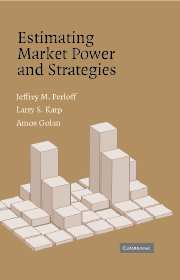Book contents
- Frontmatter
- Contents
- Foreword
- 1 Introduction and overview
- 2 Structure–Conduct–Performance
- 3 Industry Models of Market Power
- 4 Differentiated-Product Structural Models
- 5 Strategic Reasons for a Dynamic Estimation Model
- 6 Dynamic Games Involving Economic Fundamentals
- 7 Estimation of Dynamic Games Involving Economic Fundamentals
- 8 Estimation of Market Power Using a Linear-Quadratic Model
- 9 Estimating Strategies: Theory
- 10 Estimating Strategies: Case Studies
- Statistical Appendix
- Bibliography
- Answers
- Index
9 - Estimating Strategies: Theory
Published online by Cambridge University Press: 04 June 2010
- Frontmatter
- Contents
- Foreword
- 1 Introduction and overview
- 2 Structure–Conduct–Performance
- 3 Industry Models of Market Power
- 4 Differentiated-Product Structural Models
- 5 Strategic Reasons for a Dynamic Estimation Model
- 6 Dynamic Games Involving Economic Fundamentals
- 7 Estimation of Dynamic Games Involving Economic Fundamentals
- 8 Estimation of Market Power Using a Linear-Quadratic Model
- 9 Estimating Strategies: Theory
- 10 Estimating Strategies: Case Studies
- Statistical Appendix
- Bibliography
- Answers
- Index
Summary
Rather than only examine market power measures, we can estimate firms' strategies directly. Structure–conduct–performance (SCP) studies (Chapter 2) examine how measures of market power vary with concentration, barriers to entry, and other factors. The static and dynamic models in Chapters 3 through 8 estimate a measure of market power (rather than rely on the measures used in SCP studies) or conjectural variation while remaining agnostic about firms' strategies. One interpretation of these studies is that, out of a set of possible models of strategic behavior, they try to determine the one that is most consistent with the observed data. In this chapter, we take a more direct approach by estimating firms' strategies. Once we have estimates of the firms' strategies, we can determine the equilibria and examine how the equilibria vary with factors that affect strategies.
This model is an extension of the structural models ideas discussed in earlier chapters. The firms' optimization behavior is specified together with all other relevant functions. With these specifications, the model is solved to yield the optimal behavior (strategies). These strategies are then estimated from the observed data. Having estimated the parameters for a specific game, we can then evaluate market power and the way it is affected by those factors that affect demand, cost, and market structure.
- Type
- Chapter
- Information
- Estimating Market Power and Strategies , pp. 211 - 234Publisher: Cambridge University PressPrint publication year: 2007



